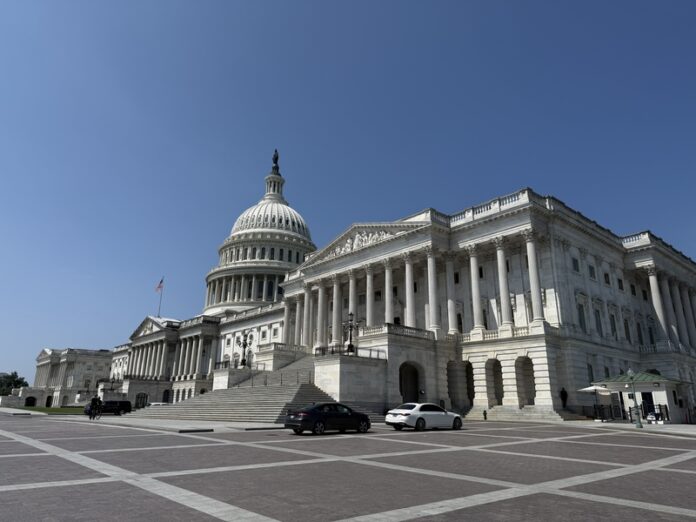WASHINGTON (States Newsroom) — The nonpartisan Congressional Budget Office said Sunday that the U.S. Senate Republicans’ proposed tax and spending cuts bill will increase deficits by $3.253 trillion over the next ten years compared to the current law.
The most recent score came just hours before senators were scheduled to start floor discussions on the comprehensive package that would restructure higher education aid programs, extend the 2017 GOP tax law, change the amount that states must contribute to the Supplemental Nutrition Assistance Program, reform Medicaid in a number of ways, and reduce spending.
Late Saturday, senators voted largely along party lines to move forward with the proposal, although leaders had to wait more than three hours to secure the necessary number of votes.
The parliamentarian decided Sunday morning that six more clauses must be changed to conform with the regulations or eliminated from the law, meaning that the revised 940-page package will still need to be changed in the days ahead.
One Alaska sweetener knocked out
GOP senators may need to reword or exclude wording that would increase the federal matching rate for Medicaid in Alaska and Hawaii, two states with high poverty guideline levels, in order to win over Alaska Republican Senator Lisa Murkowski. The program is operated as a state-federal cooperation for low-income individuals and some individuals with disabilities.
The two Republican senators from Alaska would have benefited most from the Republican advantage because Hawaii is represented in Congress by a Democratic delegation.
The lawmaker’s most recent decision cleared wording that will gradually reduce the maximum percentage states can set for Medicaid provider tax rates from the current 6% to 3.5% in 2032, which is excellent news for Senate Republicans.
GOP senators from all parties have expressed a great deal of annoyance with the in-the-weeds policy, claiming that a previous version would have put financial hardship on rural hospitals by starting the process a year earlier.
Planned Parenthood
A number of other policy changes in the bill are still being examined by the lawmaker, such as whether Republicans may ban Medicaid money to Planned Parenthood for a year, so preventing patients from accessing services there at all.
With few exceptions for rape, incest, or the life of the expectant patient, federal law currently forbids the use of federal public funds for abortions. Therefore, this amendment will prohibit Planned Parenthood from providing other health care, such as yearly physicals, contraception, and cancer screenings, to Medicaid patients who would have few other options.
A previous iteration of the measure prohibited Planned Parenthood from receiving federal funds for the ensuing ten years.
A request from States Newsroom regarding the potential future effects of the rulings on the measure was not immediately answered by Senate Finance Committee Chairman Mike Crapo, R-Idaho.
“The latest rulings show that Republican attempts to give away goodies that benefit certain states will not pass muster under Senate rules,” said Ron Wyden, a Democrat from Oregon and ranking member of the Senate Finance Committee.
According to Wyden, Senate Democrats have also been successful in opposing a Medicaid giveaway to Big Pharma and measures that make it more difficult for elderly and children to access affordable health care. Democrats have wrangled waiting periods, lock-outs, and yearly care caps out of the package, despite Republicans’ desire to reinstate these health care strategies. The Republican rewriting of the provider tax adjustments will remain in the law, which disappoints me because it would force states to make severe cuts to health care that is essential for Americans with disabilities, seniors, and children. We will keep opposing any attempt to smuggle detrimental health care provisions into this ethically reprehensible law.
Lengthy debate, amendment fights ahead
There are a number of obstacles Republicans must overcome before they can pass the full package before the Fourth of July.
The Senate floor debate is expected to continue until early Monday morning, since it can last up to 20 hours. Members of each political party will then have the opportunity to suggest amending or eliminating specific provisions of the legislation during a protracted amendment voting session.
Although Republican senators are likely to propose modifications, the mechanics of reconciliation make it impossible for GOP leaders to avoid public disagreements inside the party.
Theoretically, vote-a-rama may go on for hours or even days because there is no time restriction or cap on the number of modifications that can be proposed.
After debating their final amendment, Democrats and Republicans will vote to adopt the Senate’s version of the big, beautiful bill. That might occur on Tuesday or Monday.
The legislation must be approved by at least 50 Republicans, with Vice President JD Vance’s vote breaking the tie. The bill cannot pass as written since more than four Republican senators have objected to it overall.
Thom Tillis, Rand Paul
Since Republican Senators Rand Paul of Kentucky and Thom Tillis of North Carolina voted against the debate proceeding, it is probable that they will also vote against the final approval. The bill’s momentum would be stopped if two more senators decided not to support it, at least until GOP leaders could alter it to get their support.
Trump blasted Tillis on social media after the vote, and he said on Sunday that he would not run for reelection.
Although far-right and centrist members of the Republican Conference in the House have expressed reservations about modifications made in the upper house, a Senate vote would return the bill to the House for a final vote.
If the 220 House GOP members are to submit the legislation to President Donald Trump for his signature by Friday, Speaker Mike Johnson, R-La., would have to maintain the backing of almost all of them.

 by
by 

